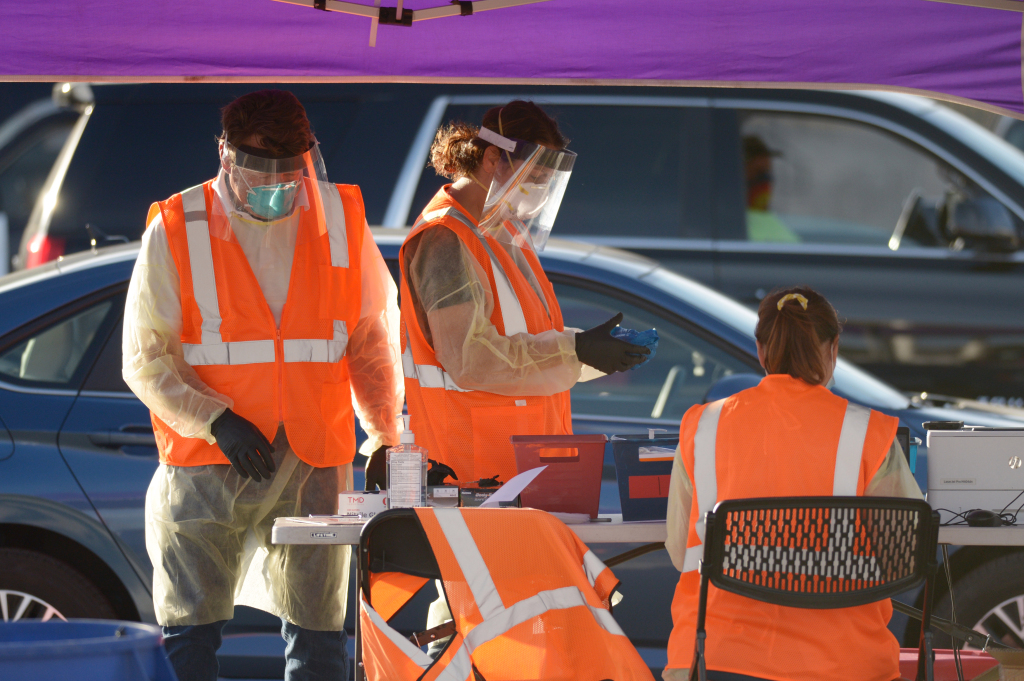COVID-19 testing sites in Denver are so swamped that public health officials are asking people who can safely delay getting tested to do so.
In addition, those who can get a private test should go that route, leaving the city’s four community sites for those with fewer resources, said Cali Zimmerman, emergency management coordinator with the Denver Department of Public Health and Environment.
The messaging shift indicates just how inundated Denver’s public health officials are with the third coronavirus wave. As Zimmerman noted, testing provides officials with much-needed information about transmission rates and community needs.
Currently Denver’s positivity rate is between 12% and 15% — two to three times worse than it was just a few weeks ago Zimmerman said.
Statewide, Colorado received a record 55,000 test results Thursday, said Sarah Tuneberg, special COVID-19 adviser for the Colorado Department of Public Health and Environment.
“Really, since the week of Sept. 13 we’ve seen a consistent demand increase of about 25% every week,” Tuneberg said.
She said there’s some evidence that the increased demand could partly be coming from people who hope to travel for the Thanksgiving holiday, but stressed that tests should not be used to justify a trip.
“Testing is a snapshot, a moment in time,” Tuneberg said. “And you could literally leave the testing site and be exposed in the process.”
The statewide positivity rate over the past seven days sits at around 12.88%,, more than double the goal of 5%. That means transmission of the virus is increasing, and that the increase in positive results is not just due to increased testing.
While other Colorado counties aren’t yet changing their approach to testing as Denver is, their capacity has also been stretched thin.
“Our team is very, very taxed,” said Assistant Summit County Manager Sarah Vaine, whose county has seen a similar increase in its percentage of positive tests. “We continue to add people, but when you have so many outbreaks it does sort of beg the question should we just assume everybody has it and stop what we’re doing?”
Vaine and others say they’re concerned that Coloradans are too fatigued with all the dire news about the virus to follow necessary recommendations like washing hands frequently, wearing face coverings, and avoiding large groups and holiday travel.
“I don’t know how to more clearly express to people that their personal behavior, the choices they make, have a direct impact on their community, the economy and the spread of this deadly virus,” Vaine said.
State officials announced tighter restrictions for 20 counties this week — including Denver and much of the metro area — in an attempt to curb transmission while also avoiding a lockdown. Hospitals are packed and too many cases exist for traditional contact tracing to effectively work.
And yet the trend still appears to be worsening.
Testing capacity
Officials test about 1,500 people each day between Denver’s community testing sites and the number has been steadily increasing, Zimmerman said. So far, those sites are able to return most results in about 48 hours and maintain enough capacity to handle the demand.
But it’s a stretch, and timing is an issue.
For example, the testing site at Paco Sanchez Park had been designed to handle between 200 to 400 people each day, Zimmerman said. Now, they’re seeing about 800 people daily — and turning some away.
“Just about every single day, if not multiple times a day, we do have to cut off the lines,” Zimmerman said.
Community testing sites are, first and foremost, for those with no insurance and no primary care physician, Zimmerman noted.
Also, testing is a lower priority for those who might have been exposed to the virus but aren’t exhibiting symptoms and have the ability to self-isolate, she said.
Denver officials plan to open a new testing site soon in the Ruby Hill neighborhood.
The Tri-County Health Department, which covers Adams, Arapahoe and Douglas counties, is still encouraging all those who want a test to get one, said Wendy Nading, program nurse manager. But it’s still a struggle.
“It almost seems like there’s a limitless need for testing. Somehow the demand is still outpacing the supply,” Nading said. “No matter how fast we stand up new testing, it just gets absorbed.”
Tri-County doesn’t conduct any tests itself. Rather, it directs residents toward contracted companies performing community tests, Nading said. But the public health agency does help coordinate support staff for those sites, which presents a challenge. The number of people seeking tests right now dwarfs what they saw as little as a month ago.
The site at Water World, north of Denver, tested 4,109 people on Monday alone, Nading said. One at the Aurora Center for Active adults tested 939, and another at Centennial’s Center Park tested 1,591 that same day.
Companies, schools and other organizations can help by organizing their own testing if they can afford it, said Dr. Sandy Johnson, director of the University of Denver’s school of global health affairs. Small-scale testing within such groups could enable quicker and more effective action should a group member test positive.
Testing still has value
The high demand is making it harder for Coloradans who need tests to get them.
Fraser resident Jeff Harper, a freelancer in television, needed a test ahead of an assignment, but no rapid tests were available at urgent care locations for 10 days. Harper had to pass on the job.
Summit County still has capacity, Vaine said. Early in the pandemic the county could perform fewer than 200 tests a day, but now — thanks to state mobile testing sites and some private/public partnerships — the county can test about 1,000 a day, which is higher than the current demand.
Despite how widespread the virus is, there’s still value in continuing to test, public health experts say. For one thing, those who test positive are alerted that they need to quarantine to prevent additional spread.
Denver Public Health Director Bob McDonald said his team can’t trace individual contacts anymore. They can, however, target hot spots and outbreaks at businesses to try to stop broader spread that way.
At the state level, Tuneberg said results influence where staff and resources are sent and inform policy decisions. It’s critical information in the fight against the virus, she said.
Still, test results do little if Coloradans don’t listen to the science and follow public health officials’ most basic recommendations, the experts agree.
“We are not ready to shut everything down,” Vaine said. “But we don’t know how to compel people any more through our messaging. The fatigue is real.”
Denver Post reporter Jessica Seaman contributed to this article.
Subscribe to bi-weekly newsletter to get health news sent straight to your inbox.


















